Maggots in Compost: Good or Bad? Here's What to Do
Author: Jen Worst | Editor: Omar Alonso
Review & Research: Jen Worst & Chris Miller
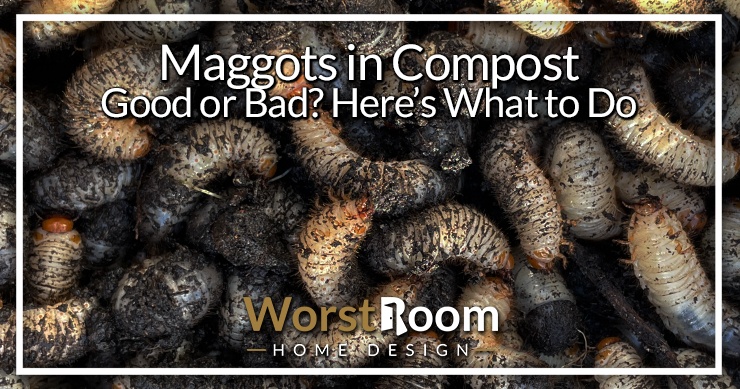
I imagine your story is similar to mine. One year after I had my first vegetable garden I decided I'd start saving nutritious food waste to turn into the garden soil.
So the first thing I did was buy a composter, the kind that you can tumble by turning a big crank or spinning it by the handles.
I also wanted to try one out in the open air, so I formed a composter bin out of chicken wire so it'd get maximum air flow and I could turn it with a pitch fork.
As you can imagine, I eventually discovered maggots in the compost bin (my other one has a screen keeping flying insects out of it's air window).
My first step when returning the pitch fork to the garage was to flip through my gardening books to see what I could find, and then I got bored of that and sat down at the computer.
Fast forward many years and I've just refreshed myself on the topic and am here to share with you everything I learned then and now about having maggots in your composter.
Black Soldier Fly Larvae
"What's that bug in my compost?" you probably exclaimed. Sometimes you'll see random larvae, worms, grubs, flies, and mealworms when you turn your compost, but compared to the common maggots you find the rest are relatively rare. What are these maggots?
They're the larvae (BSFL) of the black soldier fly (BSF), scientifically labeled the hermetia illucens. You can identify them because they have a chubby appearance, fatter than the housefly kind you would expect to find in your outdoor garbage bin.
They'll begin their life as a white color and become grey, light brown, and dark brown as they age and depending on the waste they're eating, The black soldier fly adult is a mimic fly that's really closer to the organ pipe mud dauber wasp.
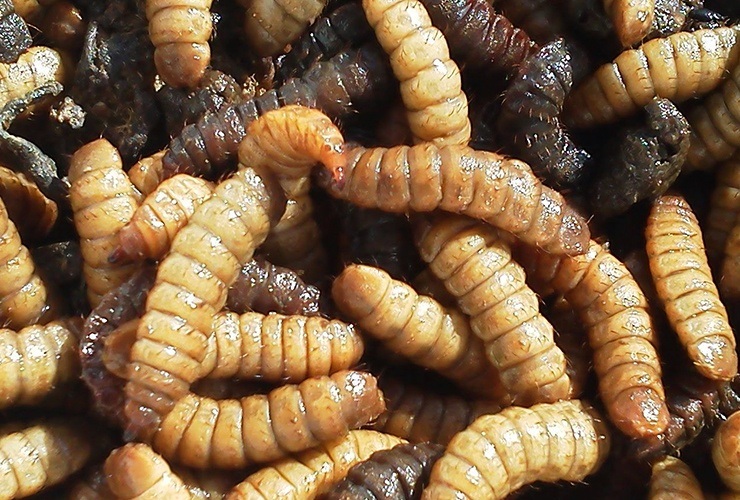
Each female black soldier fly will lay as "few" as 200 and up to 650 eggs at a time, preferably into manure, compost, and other types of decaying matter.
These eggs will hatch within 4 days, resulting in maggots (black soldier fly larvae, or BSFL) that are about 0.04 inches in length. These can grow up to 1 inch in length by around the 20th day before they go into the pupal stage and become adults.
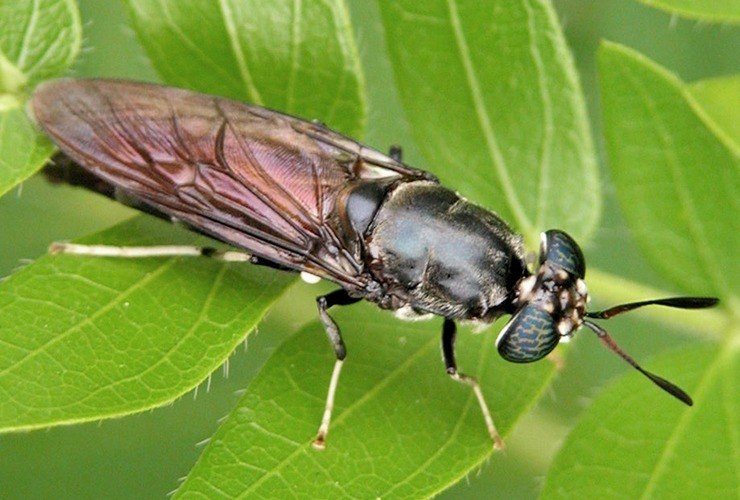
These larvae are so good at composting there's actually entire industries surrounding BSFL farming, like grub composting, worm farming, and even using them as pet food.
So professionals use them and earthworms and fungi to get this job done, but what about us at home. Are maggots in our compost good or bad?
Well, let's answer that and then get into why they're in there in the first place. Then we'll talk about the ramifications of having them snacking on your compost, and offer some solutions to the possible problem.
Is it Okay to Have Maggots in My Compost?
Yes. It's okay. You're not going to eat them and they won't end up in your vegetables during the next season.
Some would argue that it's better to have these maggots than not to, because they help ensure that your compost bin gets broken down to a level that will better serve your garden.
Others argue that they'll eat too many of the nutrients. Both are true and neither are critical to the success of your garden.
The reason both are true is because having some will accelerate the breakdown of the waste you're collecting. Without a little help from bacteria and our insect friends, it'll never be ready by the next season.
But too many and you'll be left with sludge that offers little in the way of nutrition for your garden. Sure, a lot of them will die, which recycles some value back to your soil conditioner, but it won't work out in your favor. This is why we talk below about finding a balance.
It may also simply gross you out and you don't want them near anything, even two or three steps removed, from food you'll be eating later. That's understandable.
We'll discuss how to get rid of them further down. But let's look into why you have so many and how to strike that much needed balance.
Causes of Maggots in Compost
We already mentioned that the BSF prefer to lay their eggs in decomposed organic matter like manure or compost. This is because there's so many BSFL and they need a lot of food especially because they're so efficient at breaking it down, so they run out quickly.
They also like a warm environment (out in the sun) that has a high humidity (moist food waste). Compost that is too wet has a much higher chance of developing a maggot infestation.
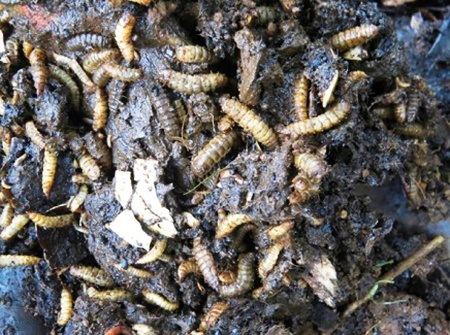
The reason you usually find these and not other types of worms, grubs, and housefly larvae is because the BSF will fight off other insects to protect their nest, and compost is a natural pesticide as it is.
And the reason you find these is usually because you've cranked the moistness up in your compost bin.
The main culprit is usually having a lot of green waste and other vegetable matter with high water content. People talk about trying to find a balance between "greens" and "browns," where browns would include dry vegetables like potatoes, hay, some wood chips, etc.
This is a ratio you have to feel out over time, you can't actually visually gauge this balance.
Another reason you can end up with too much moisture is you aren't mixing your compost pile often enough.
You should turn your tumbling composter or mix up your open air compost with regular types of shovels or pitch forks frequently enough to not have extremely moist pockets at the bottom or in the center of your bin.
Of course you don't want to dry it out completely either, so again there's the balance you're seeking to obtain.
How to Get Rid of the Maggots in Compost
Again, some larvae are okay and even preferable, but too many can make things move too fast and oddly enough, too slow, sometimes. Let's look at ways to reduce the number of maggots or even eliminate them entirely:
- Add less greens and more browns
- Add some lime to your compost
- Don't let the BSF into your bin
Like we mentioned above, greens refer to moist food waste while browns refer to dry waste and plant material. You can choose to add less greens or if you do add more, make sure you add even more browns while you're at it.
Browns will distribute the moisture and help make it a little too dry for the BSFL's taste (see image below). Also, you can have a thick layer of browns along the top to disinterest the adult female BSF.
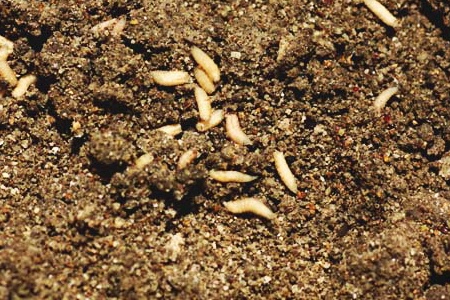
We're talking dried leaves, dead grass clippings, shredded newspaper, wood chips, hay, and other carbon heavy materials. Stop worrying about how to get rid of grass clippings, just toss it in the compost.
Sometimes having less greens is good too, though, because you offer them less food, meaning fewer maggots can survive after hatching (and we're talking about hundreds per fly that chooses your compost as the perfect place to lay their eggs).
You can add some lime to your compost bin. This will raise the pH levels of the bin and convert ammonium nitrogen into ammonia gas which will be toxic for the little buggers.
The only problem is, this is also bad for the microbes that do the heavy lifting in breaking down your compost. They need more nitrogen than less.
Another issue with adding lime is that your compost will ultimately already be on the alkaline side having a high pH level at the end of the cycle. Adding lime will only make that higher, which can be too high for your garden later.
Some will suggest adding sulfur to make it more acidic later, but avoiding the issue altogether is better.
Finally, you can either purchase a composter that is enclosed and has screens built in for air flow that don't let the BSF through, or try to wrap your open air bin with mesh screens (I've not been successful with this, they still sneak through tiny gaps I can never find).
My dad decided at one point he was going to raise chickens for eggs. This lasted a few years but one year he spread his compost out in the yard and let the chickens peck through it for the maggots, and then shoveled it all back into the bin.
I thought that was pretty clever and it's something you can consider if you raise wild birds like that. You can do it yourself with rubber gloves if you're so inclined.
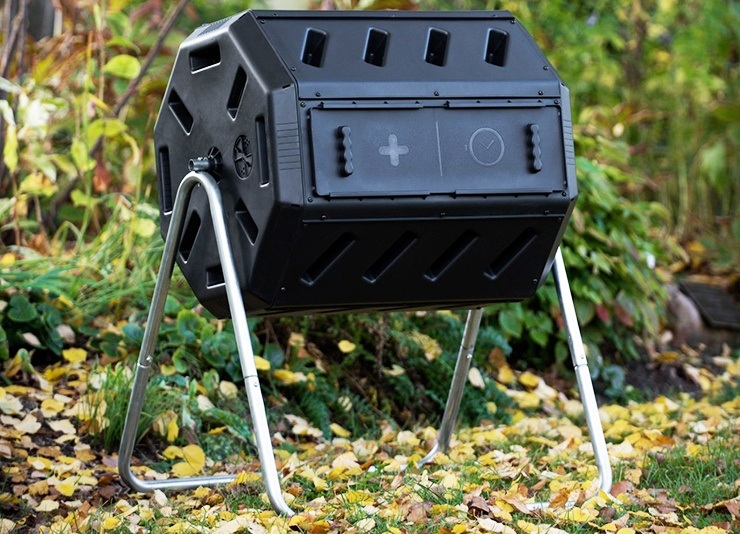
This is my composter above, one that has never had BSFL in it. I wouldn't mind a few and have even considered contaminating it a bit from my open air bin, but haven't done that yet.
It's pretty big and as long as you turn it so water doesn't get in (I haven't had issues but I always leave the doors face down), it's never too heavy to turn.
Composting Maggots: Frequently Asked Questions
To save the quick scroller some time, we've collected the most common questions here for you.
Is it OK to Have Maggots in my Compost?
Yes, to a degree. You don't want a massive infestation or they'll take out too many nutrients, but some will help accelerate your composting and make sure it's ready for the next season. The reason to get rid of them is if there's too many or you just find it gross.
Are Maggots Bad for Your Garden?
No. If you distribute your compost amongst your garden plot before tilling the soil, you'll turn in the maggots as well, which provide a nutritious value too. Some may grow into adults and fly off, others may suffocate under the soil. But it's not harmful to you or your vegetables or plants.
Why Does My Compost Have Flies?
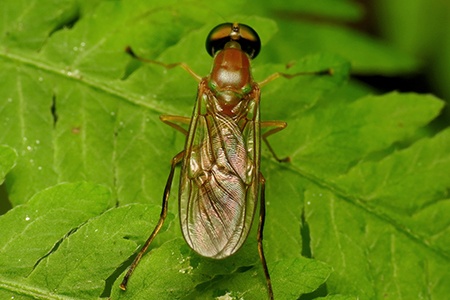
Because you've allowed it to become one of the ecosystems the BSFL thrives in. It is too moist while being too warm.
If you turn it more often so there's not moist pockets, that will help, along with adding less green material (vegetable waste) while adding more brown material (dried leaves, newspaper clippings, etc.).
How Do I Get Rid of The Maggots?
Add more brown material and less greens, meaning more leaves, grass, newspapers and less vegetables. You can turn your compost more often to make sure there's less moisture inside. You can install mesh screens so the eggs can't be planted.
And you can add a tiny bit of lime to disrupt the pH levels (but too much and you'll hurt your garden). You can spread out your compost and allow birds to pick out the maggots and then gather it back together in the bin. You may not need to get rid of them unless you're starting to have a fly infestation problem, in which case this is how to get rid of flies in your garage and other areas.
Maggots in Your Composter are Fine!
What we've learned is that, in most cases, maggots in your compost is just fine. But it can be good or bad. If you allow a giant infestation then you'll end up with less nutritious compost, but even then the damage is minimal.
Your garden will still be better off with your less-than-perfect compost than with none whatsoever.
You'll Also Enjoy:
- Perlite vs. Vermiculite: What's the Difference? (& How to Use Each)
- 28 Apartment Garden Ideas That Will Activate Your Green Thumb
- How to Get Rid of Fungus Gnats - Quickly & Permanently
- 21 Plants That Repel Ticks: Fresh Smells We Love & Ticks Hate!
- Perlite vs. Vermiculite: What's the Difference? (& How to Use Each)



